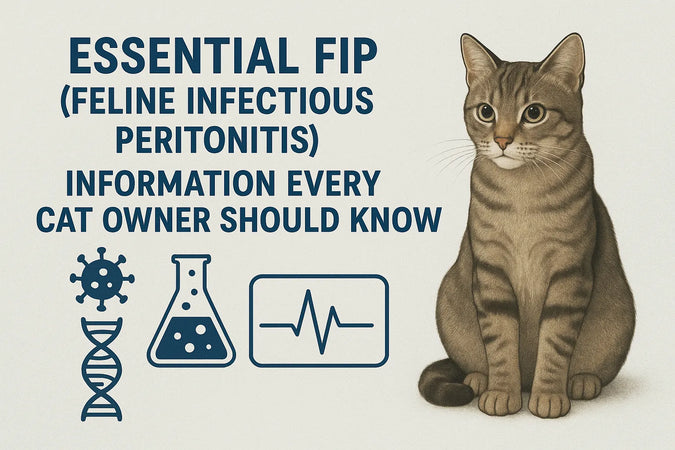
Cats are beloved members of many families, but they can be vulnerable to specific health issues that require attention and care. One such condition is Feline Infectious Peritonitis (FIP). Understanding its symptoms, causes, and treatment options can help ensure your cat stays healthy and safe.
What is FIP?
FIP is a severe viral disease affecting cats, primarily caused by a mutation of the feline coronavirus. It is important to note that not all coronavirus-infected cats will develop FIP. The disease is most commonly seen in young cats and is highly fatal if left untreated. Feline infectious peritonitis can present in two forms: the wet form and the dry form, each with distinct symptoms and consequences.
Causes of FIP
FIP develops when the relatively common and generally non-threatening feline coronavirus (FeCV) mutates into a more dangerous form. This mutation often occurs within the cat's body, but the exact reason behind this mutation is still a subject of research. However, several factors may increase a cat's risk of developing this condition:
- Age: Cats under two years of age are most susceptible.
- Environment: Cats in multi-cat households or shelters have higher exposure rates.
- Genetics: Some breeds, such as Bengals and Persians, may be more prone due to genetic factors.
- Stress: Stressful conditions can compromise a cat's immune system, potentially leading to FIP.
Symptoms of FIP
Recognizing the symptoms of FIP is crucial for early intervention and care. The disease can manifest in various ways, often making diagnosis a challenge. Here’s how FIP may present in your feline friend:
Wet Form of FIP
The wet form of FIP is characterized by the accumulation of fluid in the cat's body cavities, particularly the abdomen and chest. This can lead to:
- Swollen belly due to fluid build-up
- Difficulty breathing from fluid around the lungs
- Fever and lethargy
- Loss of appetite and weight loss
Dry Form of FIP
The dry form lacks the fluid accumulation seen in the wet form and instead causes the formation of nodules in organs like the spleen or liver. Symptoms may include:
- Persistent fever that doesn't respond to antibiotics
- Weight loss and decreased appetite
- Jaundice and anemia
- Eye inflammation
Diagnosis of FIP
Diagnosing FIP can be complex due to the varied nature of its symptoms and the lack of a definitive test. Veterinarians often rely on a combination of clinical signs, history, blood tests, and sometimes, examinations of any accumulated body fluids. Advanced imaging techniques and biopsy of affected tissues may be necessary for a more accurate diagnosis.
Treatment Options
Currently, no absolute cure for FIP exists, but treatments can help manage symptoms and improve quality of life. Here’s how you can support your cat:
- Medications: Certain antiviral drugs have shown promise in recent studies, potentially slowing FIP progression.
- Supportive Care: Ensuring comfort and stability through nutritional support, hydration, and pain management can significantly improve your cat’s well-being.
- Monitoring: Regular veterinary check-ups are essential to track the disease's progression and adjust treatment plans as needed.
Can FIP Be Prevented?
Completely preventing FIP may not be possible due to its complex nature, but some steps can reduce the risk:
- Maintain good hygiene in multi-cat environments to minimize exposure to the feline coronavirus.
- Reduce stress for your cat by providing a peaceful, stable living situation.
- Responsible breeding practices can help diminish the genetic predisposition to FIP.
Understanding the Prognosis
FIP is often seen as a terminal diagnosis, especially in its advanced stages. However, advances in research are paving the way for more effective treatments and possibly a cure in the future. Knowing the signs and acting quickly can make a significant difference in managing the condition.
Conclusion
FIP is a challenging condition for any cat owner to face. By being informed and proactive, you can help your feline friend live a comfortable, fulfilling life, even in the face of such a daunting diagnosis. Stay attentive to your cat's health and consult with your veterinarian to receive expert guidance tailored to your pet's unique needs.
The information provided in this article is based on research from trusted sources, including the Cornell University College of Veterinary Medicine - FIP Health Information.
Need FIP Treatment for Your Cat?
Don't wait - early treatment gives the best chance of recovery from FIP.
Get FIP Treatment Now


